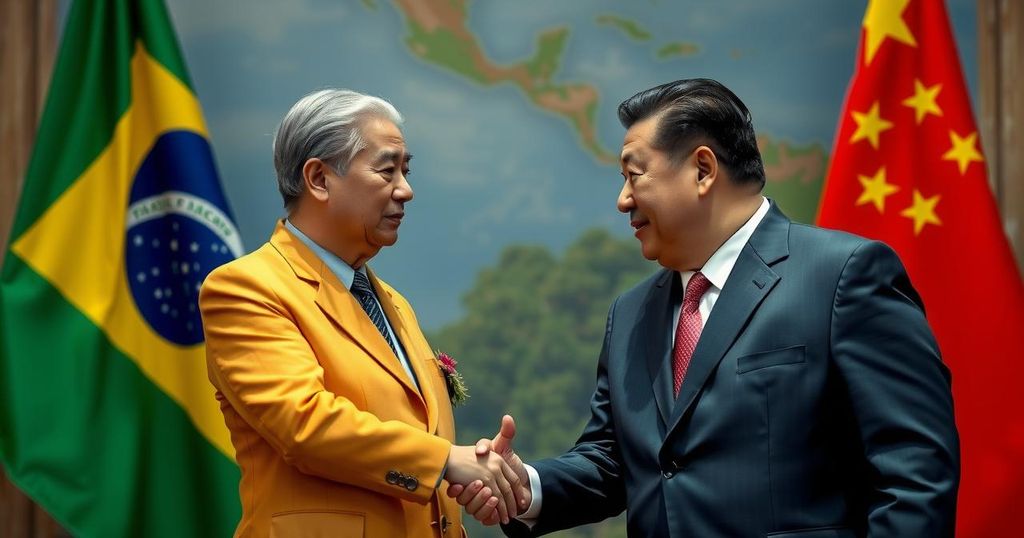Xi Jinping and Lula da Silva Strengthen China-Brazil Relations During Visit

Chinese President Xi Jinping and Brazilian President Luiz Inacio Lula da Silva enhanced bilateral ties during a state visit, establishing a “Community with a Shared Future for a More Just World and Sustainable Planet.” The leaders signed nearly 40 cooperation agreements, emphasizing synergies with the Belt and Road Initiative while reflecting on China’s growing geopolitical influence amidst U.S. diplomatic challenges.
During a recent state visit to Brazil, Chinese President Xi Jinping and Brazilian President Luiz Inacio Lula da Silva announced the elevation of the bilateral relationship to a global strategic partnership. The leaders referred to their alliance as a “Community with a Shared Future for a More Just World and Sustainable Planet.” This declaration mirrors Xi’s broader diplomatic strategy to reinforce relationships with key nations globally. They emphasized collaborative potentials, specifically aligning the Chinese Belt and Road Initiative with Brazilian development agendas, though Brazil has opted not to officially join this initiative.
In a display of commitment, nearly 40 cooperation agreements were ratified, enhancing trade ties that surpass $150 billion. Xi expressed that this historic development could position China and Brazil as “golden partners” in the international arena. Furthermore, this relationship is crucial as it highlights China’s growing influence in the global geopolitical landscape, particularly in light of U.S. President Joe Biden’s limited capacity for international commitments due to the imminent transition of power in the U.S.
The state visit followed Xi’s significant participation in both the Asia-Pacific Economic Cooperation forum and the G20 summit, where he garnered attention alongside leaders from Brazil, India, and South Africa, core countries in the BRICS coalition. Observers noted Xi’s strategic maneuvering amid concerns regarding U.S. foreign policy under a potentially Trump-led administration. Experts believe that through this approach, China is seeking to alleviate past tensions and redefine its role in global forums.
Diplomatic sources pointed out a noticeable shift in Beijing’s style, with officials becoming increasingly proactive in fostering a broader consensus on various global issues, previously shunned by them. Chinese representatives even facilitated discussions on topics like women’s rights, illustrating a deliberate attempt to enhance China’s presence in multilateral settings left potentially unattended by a disruptively inward-looking U.S. administration. This evolution is indicative of China’s broader ambitions on the world stage amidst a shifting geopolitical climate.
The context of the recent state visit is significant given the geopolitical shifts and the changing landscape of international relations. President Xi’s visit to Brazil synergizes with his broader aim of strengthening China’s influence within the Southern Hemisphere through strategic partnerships. Lula’s administration is poised to cultivate Brazil’s position within this dynamic framework, especially since the post-pandemic recovery and new geopolitical realities necessitate diverse economic cooperation. Additionally, the implications of U.S. foreign policy uncertainty under President Biden, and potential changes loom with Trump’s anticipated return to office, further accentuate the importance of strengthening ties between China and Brazil.
In conclusion, the elevation of China-Brazil relations signifies not only a strategic partnership grounded in economic cooperation but also highlights China’s active role in filling the diplomatic void potentially left by the United States. The agreements signed during Xi’s visit mark a pivotal moment for both nations as they navigate the complexities of a changing global order. As China adapts its diplomatic approach to emphasize multilateral engagement, it reflects a commitment to reshaping its international standing, with Brazil positioned as a key ally in this endeavor.
Original Source: www.voanews.com








